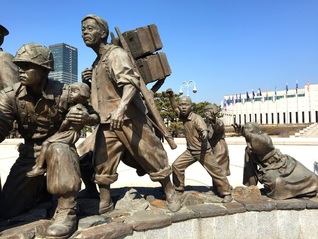 These are refugees during the Korean War at a war museum in Seoul, but they could be migrants anywhere. These are refugees during the Korean War at a war museum in Seoul, but they could be migrants anywhere. I have been proofreading a doctoral dissertation this week. No, not mine. You won't need to call me Dr. Hardy in the foreseeable future. I'm just the proofreader. The researcher and future PhD is a Korean missionary to Muslims. She explores the experiences of Muslim migrant workers in Korea and how those experiences affect their faith and practice as Muslims. I recently visited Korea, but this dissertation showed me a completely different side of the country. Until recently Korea was one culture--one language, one set of values, one kind of cooking, one style of doing business. Their new prosperity has created a need for more workers, especially those willing to do the difficult, dirty, and dangerous jobs that Koreans don't want. These workers come from all over Asia and encounter a culture very different from their home cultures. Many of them are Muslim. Although Korea is no longer mono-cultural when it comes to religion, there are far more churches and Buddhist shrines than mosques.
Too often these Muslim workers experience rejection, misunderstanding, insults and jokes at their expense. The boss doesn't understand the importance of afternoon prayers that interrupt the workday. Saturday and Sunday are the official days off--not Friday when Islam requires the faithful to gather at the mosque for a sermon and prayers. The mosque may well be inaccessible anyway--a couple hours away by bus. Company meals, intended to bring employees together and promote camaraderie, include alcohol and pork mixed into many dishes and hard to recognize if you are an outsider. Both are strictly prohibited by the Muslim faith, so Muslim employees tend to avoid these dinners, further isolating themselves from their peers. The worker misses his extended family. He wrestles with having to do cooking and cleaning chores that men never do at home. His sensibilities are shocked by the immodesty of Korean fashion. Even if labor laws allowed him to bring his family (which they don't), he would be reluctant to put his daughters into a school where the uniform is a short skirt, and physical education requires wearing shorts, scandalously exposing her legs. The newly arrived worker had to pass a Korean language exam before coming, but chances are he doesn't have the fluency to communicate his needs or concerns. The week that I was proofreading, the news was full of the trial of the Boston Bomber. Dzhokhar Tsarnaev was eight when he immigrated to the US with his family, Muslim refugees from the former Soviet Union. He even became an American citizen. How did he and his older brother become so alienated that they would blow up children and by-standers at an iconic foot race? As I read the dissertation, I wondered about the experiences of the Tsarnaev family in the US. Did they find the same indifference and lack of understanding of their Muslim values as Muslim migrant workers in Korea? Also in the news were six young men from the Somali community in Minnesota, arrested while trying to leave the country to join ISIS. ISIS! An organization so evil it delights in beheading Christians and fellow-Muslims alike and posting videos to prove it! What kind of pain could lead young men in America to join their killing spree? Despite the large (25,000+) Somali community in the Minneapolis/Saint Paul area, did they feel excluded from our society at large, shut out of the American Dream? Were they mocked and humiliated for their prohibitions of alcohol? Was no one ready to befriend them and relate to the world they had come from? Far more churches than mosques in Korea ... What is the church's role in this? The author of the dissertation found great responsiveness among Muslim migrant workers who visited mission centers set up to help them with the practical needs of their lives in Korea. What if Christians had reached out to the Tsarnaev family and helped them through their transition from the wreck of Communism to American life? Are there Christian groups helping Somalis in Minnesota to navigate the system and successfully integrate into our society without denying who they are? Or are they being isolated because their long skirts and head-coverings, their foods and their customs, mark them as different? It seems to me that this dissertation is about a lot more than Muslim migrant workers in Korea. It is about opening our hearts to those who come to these shores as our ancestors did, listening to them, and loving them in the name of Jesus.
0 Comments
Leave a Reply. |
AuthorLeAnne Hardy has lived in six countries on four continents. Her books come out of her cross-cultural experiences and her passion to use story to convey spiritual truths in a form that will permeate lives. Add http://www.leannehardy.net/1/feed to your RSS feed.
To receive an e-mail when I post a new blog, please subscribe.
Categories
All
Archives
November 2022
|
 RSS Feed
RSS Feed